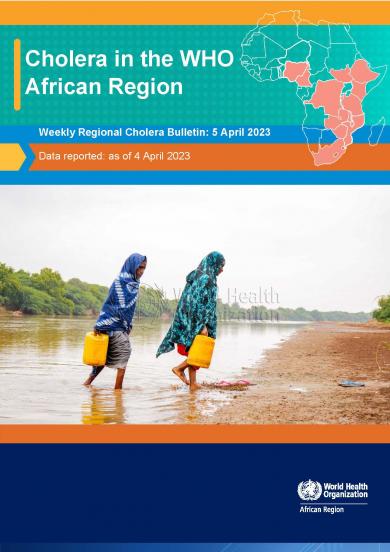
Cholera in the WHO African Region: Weekly Regional Cholera Bulletin: 05 April 2023
The cholera outbreak in the WHO African Region continues to evolve, with 14 countries currently affected. The Kingdom of Eswatini declared a new cholera outbreak on 4 April 2023 following confirmation of the disease in a traveller from a neighbouring country who arrived on 27 March 2023. This highlights the need for Member States to enhance readiness, heighten surveillance and institute preventive and control measures at the points of entry to prevent and mitigate cross border infection. The concurrent climate-induced natural disasters such as cyclone and flooding in the southern African region and drought in the Horn of Africa threatens to impede the progress made in controlling the ongoing outbreaks. The cholera trends are being closely monitored as response and readiness measures are ramped up.
In week 13, there was a 40.7% decrease in incidence cases, with 6 464 cases recorded from seven countries compared with 10 896 cases reported from 11 countries in week 12. There was also a 29.8% decrease in deaths recorded during the same period, as 40 deaths occurred in week 13 compared with 57 in week 12 of 2023.
Cumulatively, 160 756 suspected cholera cases have been reported, including 3288 deaths (case fatality ratio (CFR = 2.1%)) as of 4 April 2023 (Table 1). Malawi accounts for 35% (56 763) of the total cases and 52% (1722) of all deaths reported, and together with Cameroon, Democratic Republic of the Congo, Mozambique, and Nigeria contribute to 78% (125 837) of the overall caseload and 91% (2984) of cumulative deaths from 1 January 2022 to 4 March 2023.
The cholera outbreaks in the African Region are happening in the context of natural disasters such as cyclones (Mozambique, Malawi), flooding (Mozambique, Malawi), drought (Kenya and Ethiopia), conflict (Cameroon, Democratic Republic of the Congo, Nigeria, Ethiopia) and multiple disease outbreaks including Mpox, wild polio, measles, COVID-19 pandemic, etc. Many countries have limited and strained resources, shortage of medical commodities, including cholera kits and Oral Cholera Vaccine (OCV). Poor sanitation and unreliable water supplies with increased cross-border movements also serve as driving factors for the outbreak across the region.


